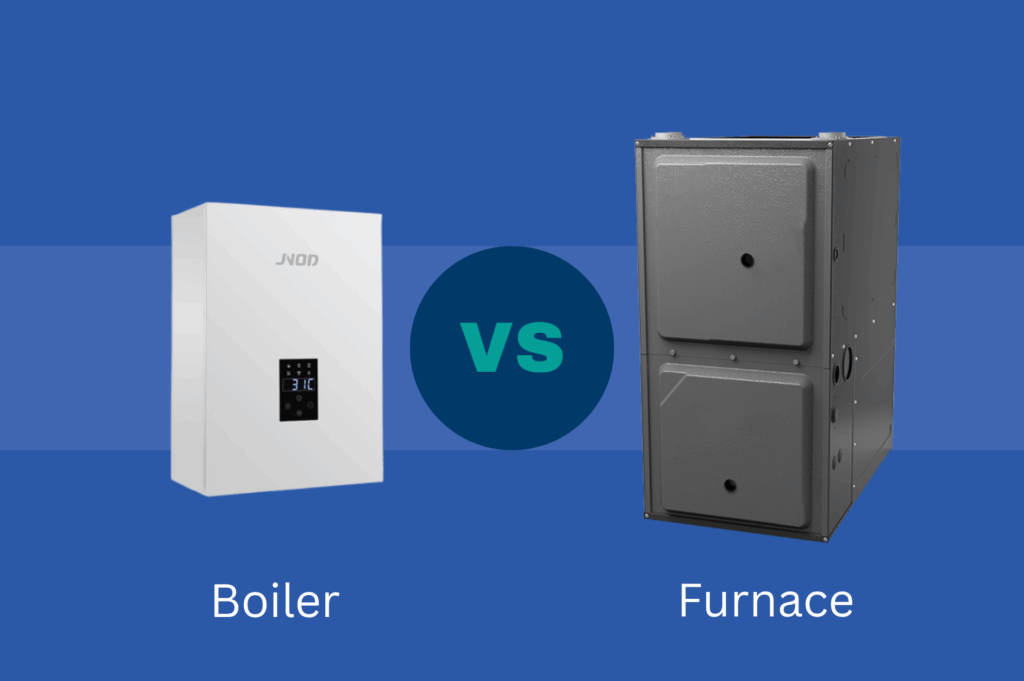Boiler vs Furnace: Which Is Right for Your Home?
Whenever winter comes, you will find the importance of the heating system. When faced with boiler vs furnace, which one will you choose? Which heating method will be right for your home?
Before comparing boilers and furnaces, we will explain how each works. This article will compare boiler vs furnace from: cost, comfort, efficiency, installation and maintenance, etc. Understanding the differences, pros and cons of furnaces and boilers can help you make the right choice of heating system.

Boiler vs Furnace: How Do They Work To Heat?
Boilers heat water, using hot water or hot water steam to heat your home, while furnaces heat air to provide warm air.
A furnace uses natural gas, propane, oil, or electricity as heating power. It heats the air and sends the warm air through the piping, vents, and other systems to heat your home.
A Boiler uses gas, oil, electricity, or wood pellets as heating power. They heat water to extremely high temperatures and use pumps and pipes to move the hot water steam or hot water to heat underfloor heating and radiators throughout the house.
Boiler vs Furnace: Which Costs Less?
If your home already has piping installed, a furnace is usually the most economical choice because you don’t have to install pipes to move warm air, saving you the installation cost. Furnaces are generally cheaper to buy and install than boilers because furnaces are more common. Boilers are cheaper to maintain because they don’t require filters to clean and have fewer moving parts.
Long-term operating costs depend on your location, fuel costs, system efficiency, home size, time and frequency of use, etc. You can make an estimate based on your specific situation.
Boiler vs Furnace: Which is More Comfortable and Efficient?
Boilers provide more consistent and even heat to each room but heat more slowly, while furnaces heat quickly but heat erratically because forced air systems can cause airflow and temperature inconsistencies. Boilers vs. furnaces, boilers that use hydronic systems are quieter; furnaces rely on blowers and fans. Radiant heating allows air quality to remain constant because the boiler heats the water to heat the floor and radiators. The warm air from a furnace dries out the air and circulates pollutants such as dust and dander throughout the home.
Modern boilers can reach very high efficiencies (over 90%), especially condensing boilers. Furnaces have also become more efficient, but older models waste more heat through piping. Modern boilers are more energy efficient and generally use less fuel to heat your home.
Boiler vs Furnace: Installation and Maintenance
Boilers are more difficult to install than furnaces because they require connection to a water tank and complex piping systems. Boilers require little maintenance, except for annual checks by an HVAC professional on pressure, water levels, and radiators. Furnaces require annual inspections and regular or even frequent air filter changes and pipe cleaning.
Boiler vs Furnace: pros and cons
| Feature | Boiler | Furnace |
|---|---|---|
| Heating Way | Heats water; distributes hot water or steam via pipes | Heats air; distributes warm air via ducts and vents |
| Heat Consistency | Even consistent heat | Faster heating, but it can create uneven temperatures |
| Air Quality | Better (no air movement of dust/allergens) | Can dry air and spread dust/pollutants |
| Noise Level | Quieter operation (no fans/blowers) | Noisier due to blowers and fans |
| Efficiency | High, especially condensing models (>90% efficiency) | Modern units are efficient, but older models lose more heat |
| Installation Complexity | More complex (piping, water tank needed) | Easier if the pipes are already installed |
| Cost | Higher equipment and installation costs | Lower equipment and installation costs |
| Maintenance | Less frequent (annual checks) | More frequent (filter changes, duct cleaning) |
| Heating Speed | Slower to warm up a space | Heats quickly |
| Best For | Homes desiring radiant heating and better air quality Cold climate location | Homes needing faster heating and lower upfront costs Mild climate location |
Summary
Choosing between a boiler and a furnace depends on your home’s needs, budget, and comfort preferences. Boilers deliver quiet, consistent radiant heat and help maintain better indoor air quality, though they cost more to install. Furnaces heat quickly and cost less upfront but may create uneven temperatures and require more frequent maintenance. If you are considering a modern solution, the JNOD electric boiler is an excellent alternative. It delivers nearly 100% efficiency, requires no fuel storage, and is compact enough for wall mounting
By understanding the pros and cons of each system, you can make an informed decision that balances efficiency, comfort, and long-term value for your home.
